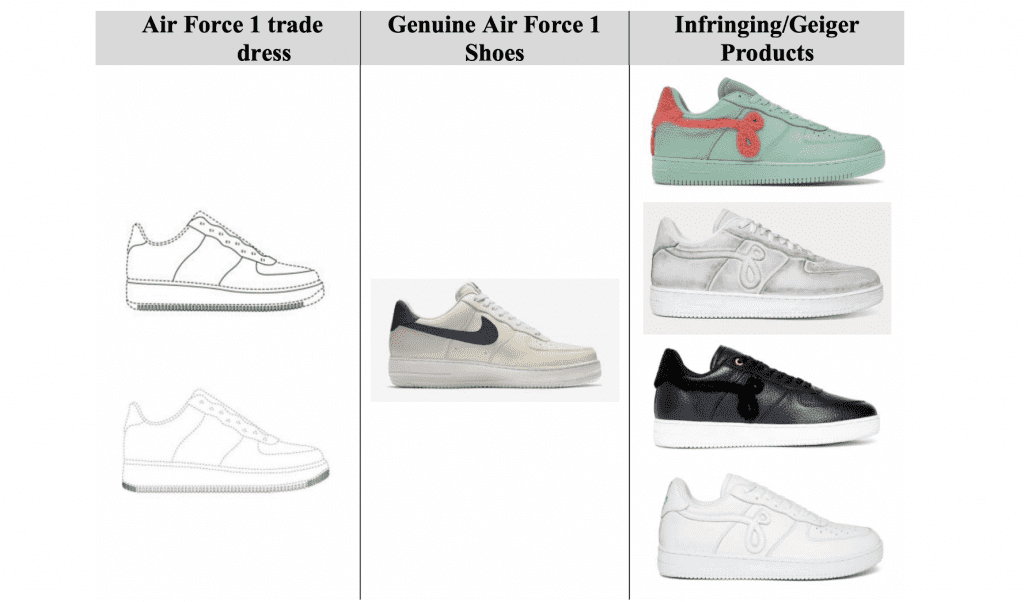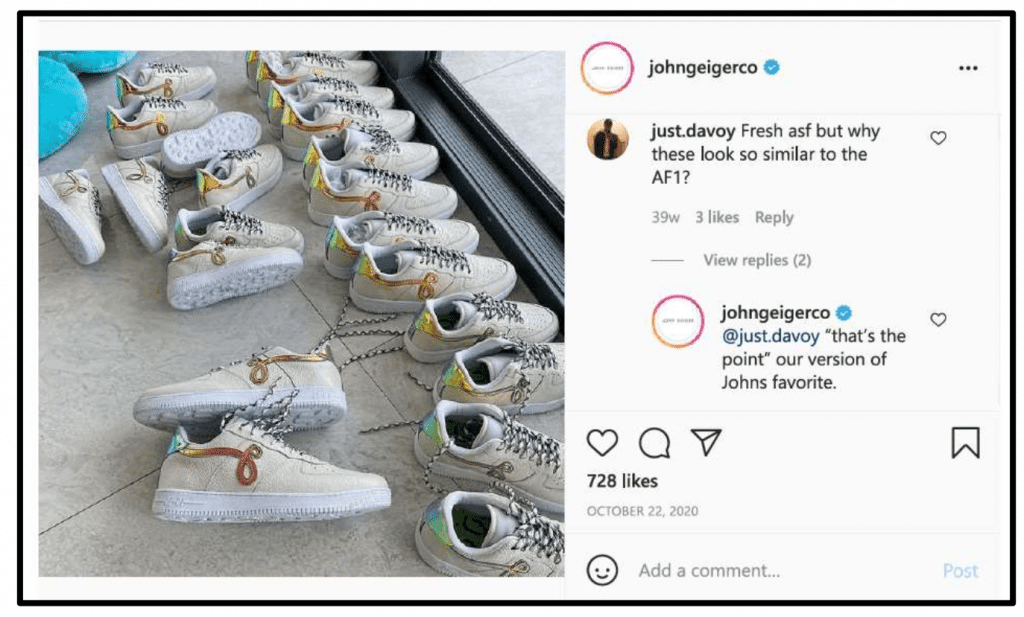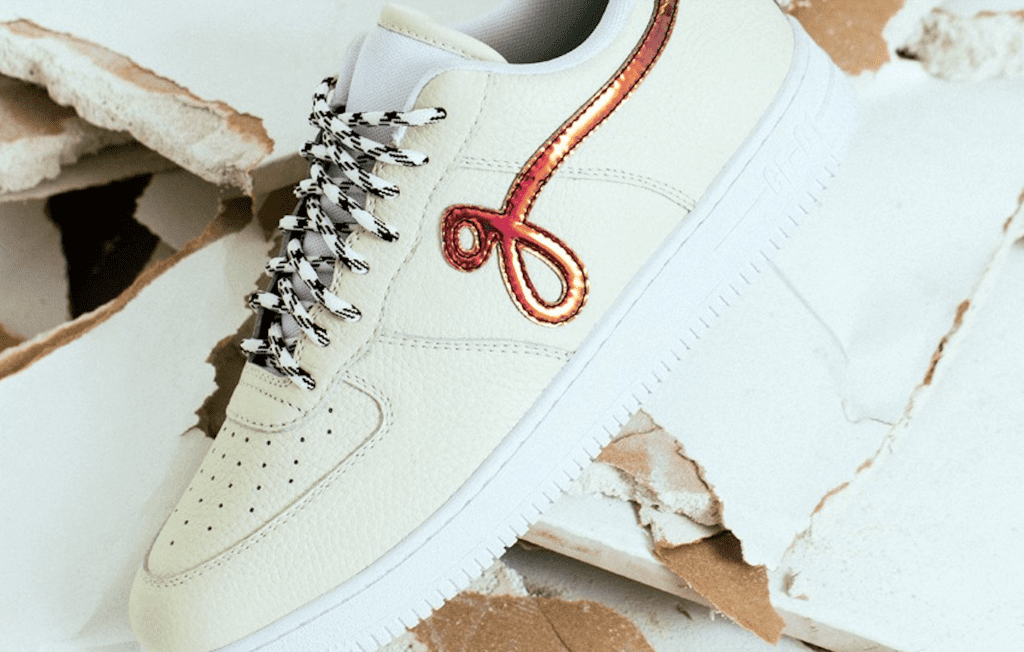Nike is bulking up the trademark infringement and dilution complaint that it filed against footwear manufacturer La La Land Production & Design (“La La Land”) by adding a new defendant to the mix. According to the amended complaint that it filed in a California federal court on August 26, Nike claims that in addition to supplying Los Angeles-based streetwear brand Warren Lotas with sneakers that infringe a number of its famous trademarks, La La Land also counts John Geiger as a customer, supplying the footwear brand with sneakers that bear Nike’s “Air Force 1 trade dress and/or confusingly similar trade dress,” but that Nike “did not manufacture or inspect” or authorize the sale of.
In the recently-amended complaint, which comes after Nike first filed suit against La La Land in January on the heels settling the case that it waged against Warren Lotas late last year in connection with the company’s sale of sneakers that mimicked its classic Dunk silhouette, Nike sets the stage by stating that “since the launch of the Dunk [sneaker] in 1986, [it] has continuously and substantially exclusively used the DUNK word mark, and promoted and sold sneakers bearing the Dunk trade dress,” resulting in a shoe that “is now recognized as one of the most iconic and influential sneakers of all time.” And just like the Dunk, “the Air Force 1, which was first introduced in 1982, has also reached cult status,” Nike asserts, noting that “nearly 40 years after its debut, the Air Force 1 shoe has been produced in over 1,700 color combinations, including numerous limited, special, and premium editions” and specifically enables Nike to routinely generate sales “in excess of $800 million per year.”
As a result of such consistent use – and widespread marketing – of the well-known sneaker styles, Nike asserts that it has amassed valuable trademark rights in their silhouettes, with its rights extending to the DUNK word mark and the Dunk trade dress, and the Air Force 1 trade dress, used with or without its famed swoosh mark.
With such well-known marks and brand goodwill at play, Nike contends that “various bad actors in the U.S. and abroad have sought to wrongfully trade off on [its] famous brand and dupe consumers into purchasing fake Nike products.” These alleged bad actors do “not only those who sell these illegal fakes directly to consumers,” per Nike, but also include “various others in the supply chain, including manufacturers and distributors that provide material assistance to direct-to-consumer infringers.” Two of these bad actors, according to Nike, are La La Land and John Geiger (collectively, the “defendants”), which have “intentionally created confusion in the marketplace by, among other things, using Nike’s Dunk and Air Force 1 trade dress.”

Specifically addressing newly-included defendant John Geiger, Nike claims that “during the course of discovery in the instant action, [it] learned that La La Land manufactured at least one [style] of John Geiger’s so-called GF-01 shoes,” thereby, making the brand a relevant party to include in the existing litigation. “Like Warren Lotas, Geiger has attempted to capitalize on the strength and fame of Nike and its Air Force 1 trade dress by making, promoting, advertising, marketing, and selling in the U.S. footwear bearing the Air Force 1 trade dress and/or confusingly similar trade dress,” per Nike, which it claims are being sold “in the identical channels of trade and to identical consumers as Nike’s genuine products.”
As for La La Land, Nike argues that “by manufacturing, distributing, sourcing, selling, and/or supplying the infringing products to Warren Lotas, John Geiger, and others,” the footwear company has “materially assisted or contributed to Warren Lotas’, John Geiger’s, and others’ offer for sale and sale of goods bearing [Nike’s trademarks] and/or confusingly similar marks in the U.S.,” thereby “causing and is likely to continue to cause confusion, to cause mistake, or to deceive the public as to the origin, source, sponsorship, approval or affiliation of Warren Lotas’ products and John Geiger products.”
Together, “La La Land and John Geiger have taken systematic steps in an attempt to falsely associate [their] infringing products with Nike,” and have “attempted to capitalize on Nike’s valuable reputation and customer goodwill” by using its Dunk and Air Force 1 trade dress, as well as its iconic swoosh logo, “in a manner that is likely to cause consumers and potential customers to believe that the infringing products are associated with Nike, when they are not,” the Beaverton, Oregon-based sportswear titan claims. Part of the problem, according to Nike stems from the fact that while the allegedly infringing sneakers at issue mirror its own designs, it “has no control over the nature and quality of the infringing products that the defendants offer.”
With such a lack of oversight in mind, Nike says that its “reputation and goodwill will be damaged – and the value of [its] trademarks jeopardized – by the defendants’ continued use of [its] marks and/or confusingly similar marks,” presumably in sales conditions and/or product quality that differ from Nike’s. For instance, Nike claims that it “maintains strict quality control standards for its products bearing [its] marks,” with its products “inspected and approved by Nike prior to distribution and sale.” Additionally, it “maintains strict control over the use of [its] marks in connection with its products so that Nike can maintain control over its related business reputation and goodwill,” including by “carefully determin[ing] how many products bearing [its] marks are released, where the products are released, when the products are released, and how the products are released.”
The sale of lookalike products by La La Land and Geiger is not only allegedly confusing consumers, Nike argues, it is also robbing the sportswear behemoth of the ability to maintain such controls. (As a preliminary point, Nike includes a couple of screenshots of social media comments in furtherance of its argument that consumers are actually confused about to the source/nature of the Geiger sneakers. As we have asserted in the not-too-distant past, these may or may not be persuasive to the court. It is worth noting that at least one of the examples seems to suggest that consumers are not actually confused about the source of the Geiger shoes and can distinguish them from Nike’s offerings even if they do look like Nike’s AF1 sneakers.)

Against that background, Nike has amended its complaint to include Geiger as a defendant, and thus, make it party to the claims of direct and/or contributory trademark infringement, direct and/or contributory false designation of origin, direct and/or contributory trademark dilution, and unfair competition. (Who said dilution claims are dead?) Nike is seeking monetary damages, as well as injunctive relief to bar the defendants from further infringing its marks and to force the defendants to deliver the infringing footwear for destruction.
In a statement in response to the amended complaint, Mr. Geiger stated, “I feel like Nike has been taking inspiration and benefitting off the hard work of myself and a lot of creators within the community over the past 10+ years.” He further asserted, “I’m preparing to fight this battle for all creators and underdogs fighting the same uphill battle as me. I’ve been very clear throughout the 2 years of developing and selling the GF-01 that this silhouette was inspired by Nike and also made sure that everyone purchasing the shoe is aware that it is a designer shoe crafted with higher end materials and quality, along with my trademark and changes to the silhouette. I also created my own mold for our outsoles with branded JG trademark and changed the pattern multiple times all while following trade dress guidelines.”
The case follows from a number of headline-making trademark cases that Nike has filed over the past several months, accusing alleged “customizers” – such as Customs by Ilene and former employee Jeffrey Waskowiak and his company KickRich LLC, which have been accused of taking otherwise authentic Nike sneakers and modifying (this is distinct from what Geiger and La La Land are being accused of) – of running afoul of federal trademark law, and asserting that it “cannot allow ‘customizers’ to build a business on the backs of its most iconic trademarks, undermining the value of those marks and the message they convey to consumers.”
The sportswear giant has faced pushback from consumers in the process, at least some of which have echoed the sentiment of Geiger in that Nike has actually benefitted from the robust market (and the resale market) for customized sneakers and/or sneakers that have been inspired by famous Nike silhouettes, which have, as some have claimed, enabled Nike to continue to enjoy greater demand than it maybe otherwise would have. More broadly, many social media users have emphasized the fact that “customizers are a huge part of sneaker culture,” and called Nike’s lawsuits against customizers “short sighted” in that they may serve to alienate even the most devoted Nike fans, thereby, shedding light on the delicate balance the rights holders face between policing unauthorized uses of their marks and being cognizant of the potential for PR fallout.
The case is Nike, Inc. v. La La Land Production & Design, Inc., 2:21-cv-00443 (C.D. Cal.)











